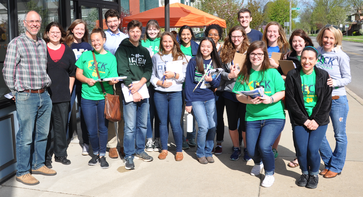“Lead is in dust and soil; it’s all around us,” states Dr. Heidi Beidinger-Burnett, Assistant Professor at the Eck Institute for Global Health. “Some areas are worse than others. Because we cannot eliminate lead from our living environments, we need to learn how to limit exposure, especially in our children.”
Lead is a toxin. According the US Centers for Disease Control and Prevention (CDC), there is a direct correlation between increased blood lead levels and decreased IQ scores. Lead exposure can affect the cognitive, motor, and behavioral abilities of children. Lead finds its way into our homes and our yards in several ways. Lead contaminated water is a product of old pipes in some communities’ water systems or individual homes. Lead contaminated dust and soil is a byproduct of old lead paint and leaded gasoline. Although neither lead paint nor leaded gasoline are still in use in the United States, the lead persists in our environment. Lead does not decay and it cannot be “cleaned-up,” so its presence in dust and soils is cumulative.
While lead contaminated water supplies have received the most attention in recent years, especially the situation in Flint, Michigan, the most common child-lead interaction is when lead-contaminated dust and soil are ingested. The CDC has documented that children have more hand-to-mouth activity and they absorb more lead than adults leading to serious, permanent physical and mental damage.
The first step to remediating the problem is to understand where the problem is. Nationally, lead screening among children 5 and under is very low, and St. Joseph County is no exception. Census tract 6 in South Bend, Indiana has been identified with the highest rates of elevated blood lead levels in the state; in this neighborhood, 31% of the children tested from 2005-2015 had elevated blood levels of lead. Due to limited testing, however, this may be underrepresenting the scope of the problem.
In response, Notre Dame faculty members and students are partnering with the Near Northwest Neighborhood (NNN) of South Bend and the St. Joseph County Health Department to better understand the scope of the problem in our community. The project aims to do so by analyzing existing data, conducting source testing in some homes in census tract 6, and increasing blood testing for children in the community. Coupled with these aims is a strong push to educate residents on the dangers of lead in our community and how to adjust to living with lead in our environment. One such effort took place last Saturday at the NNN Community Center.

Beidinger-Burnett along with fellow faculty members Lacey Ahern, Associate Director of Global Health Training, and Eck Institute for Global Health member Dr. Marya Lieberman, Professor of Chemistry and Biochemistry, worked with Kathy Schuth, NNN Executive Director, and Sue Taylor, Early Childhood Services/WIC Manager, Beacon Health Systems, to plan and host a “Get the Lead Out” event that was held last week. Students from Notre Dame and Saint Mary’s went door-to-door to encourage residents to bring their children to NNN for free lead testing and ice cream.
Graduate student Danielle LaFleur, a member of Notre Dame’s Master of Science in Global Health class of 2017, coordinated the logistics of the outreach event including the development of the event flyer that was left at every home visited. “We had a fantastic day of outreach, education, and awareness. We visited 629 homes in the neighborhood around NNN and spoke with 165 homeowners and renters,” LaFleur, stated. Further, 34 blood tests were taken; test results will be available in approximately two weeks.
“The information compiled during this project will be used to help our Health Department develop both a short-term and a sustainable plan to address the lead problem in our community,” states Beidinger-Burnett, who also serves as a member of the Board of Health for the St. Joseph County Health Department. “It’s a great start to address an important health challenge for all of us. No one is exempt from lead exposure.” The collective task of education and gaining the tools to learn to live with lead is the responsibility of our entire community. Luckily, many stakeholders are coming together to address the challenges of lead, with a focus on education and prevention for our children.
The Eck Institute for Global Health is a university-wide enterprise that recognizes health as a fundamental human right and endeavors to promote research, training, and service to advance health standards for all people, especially people in low and middle-income countries, who are disproportionately impacted by preventable diseases.
Photo: “Get The Lead Out” event participants including Notre Dame’s Master of Science in Global Health students and faculty. Dr. Heidi Beidinger is far right.
Contact: Heidi Beidinger-Burnett 574-631-7636 hbeiding@nd.edu
Originally published by at globalhealth.nd.edu on May 02, 2017.